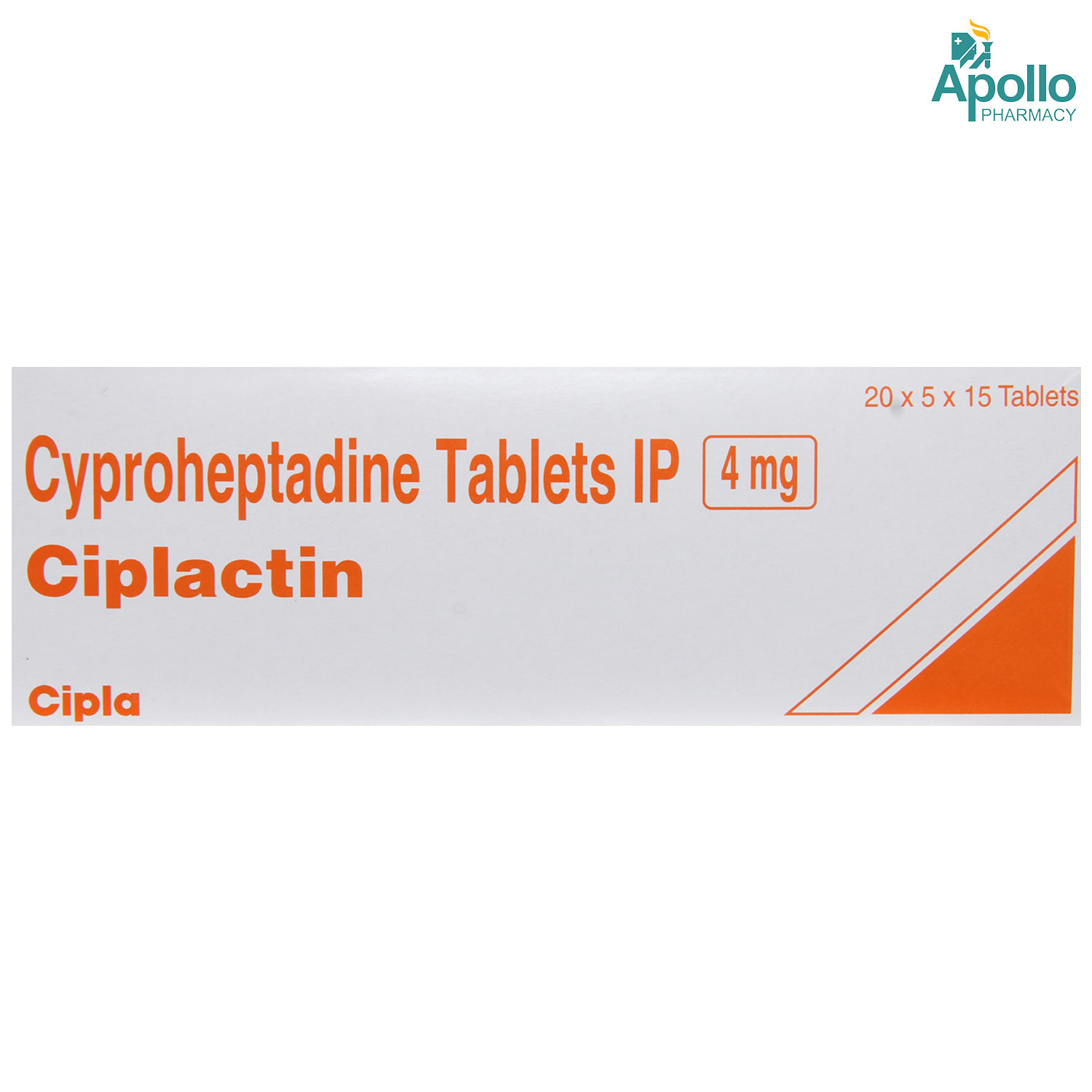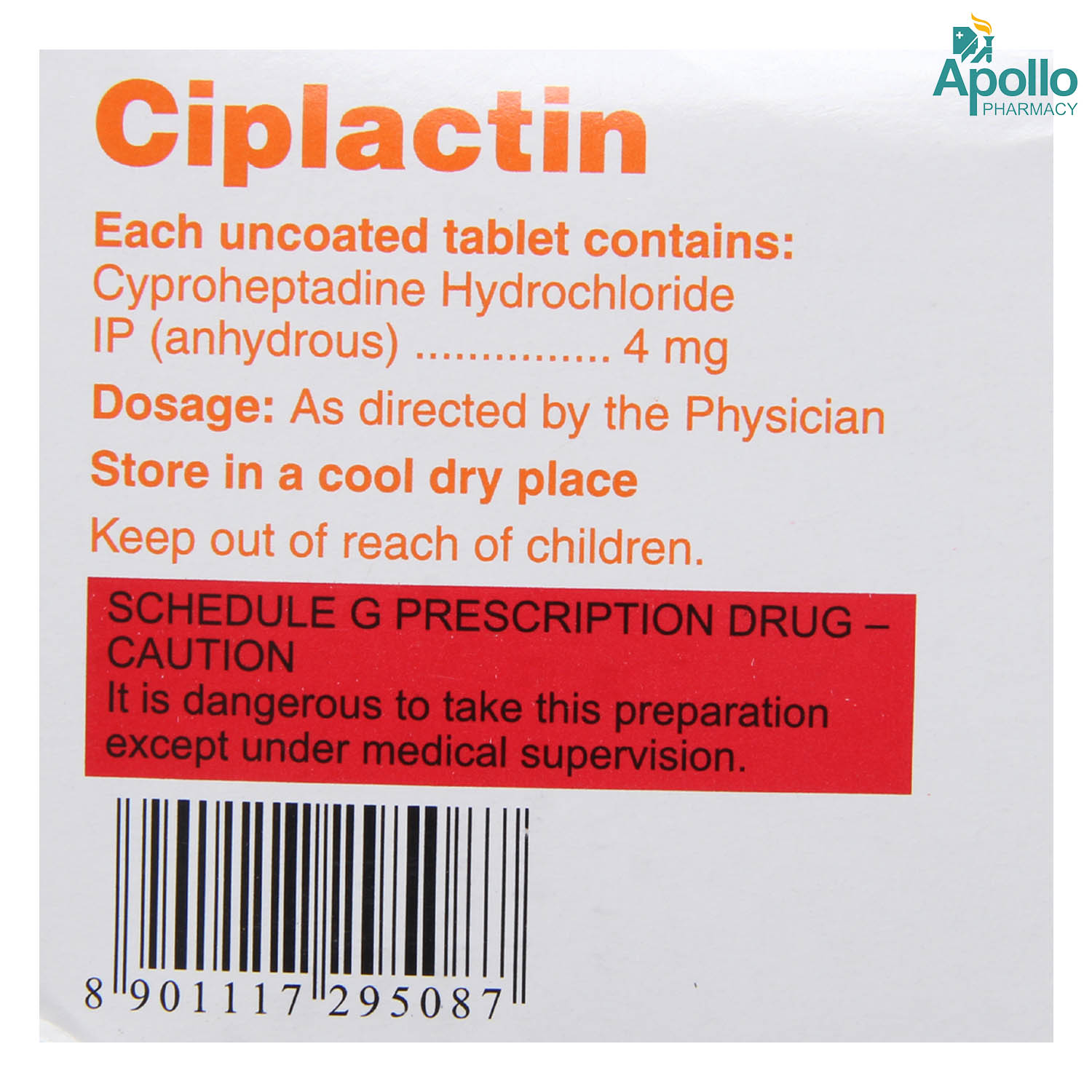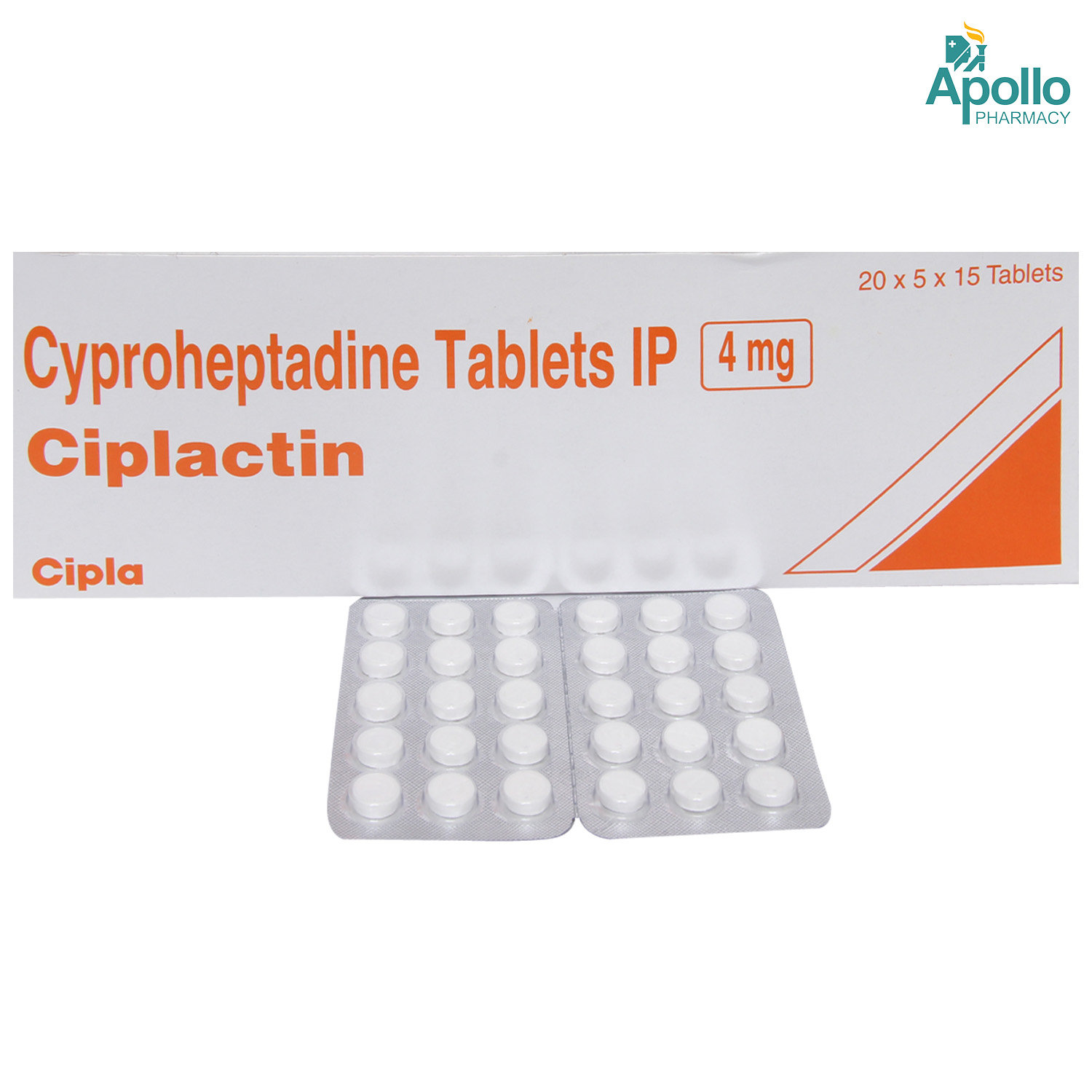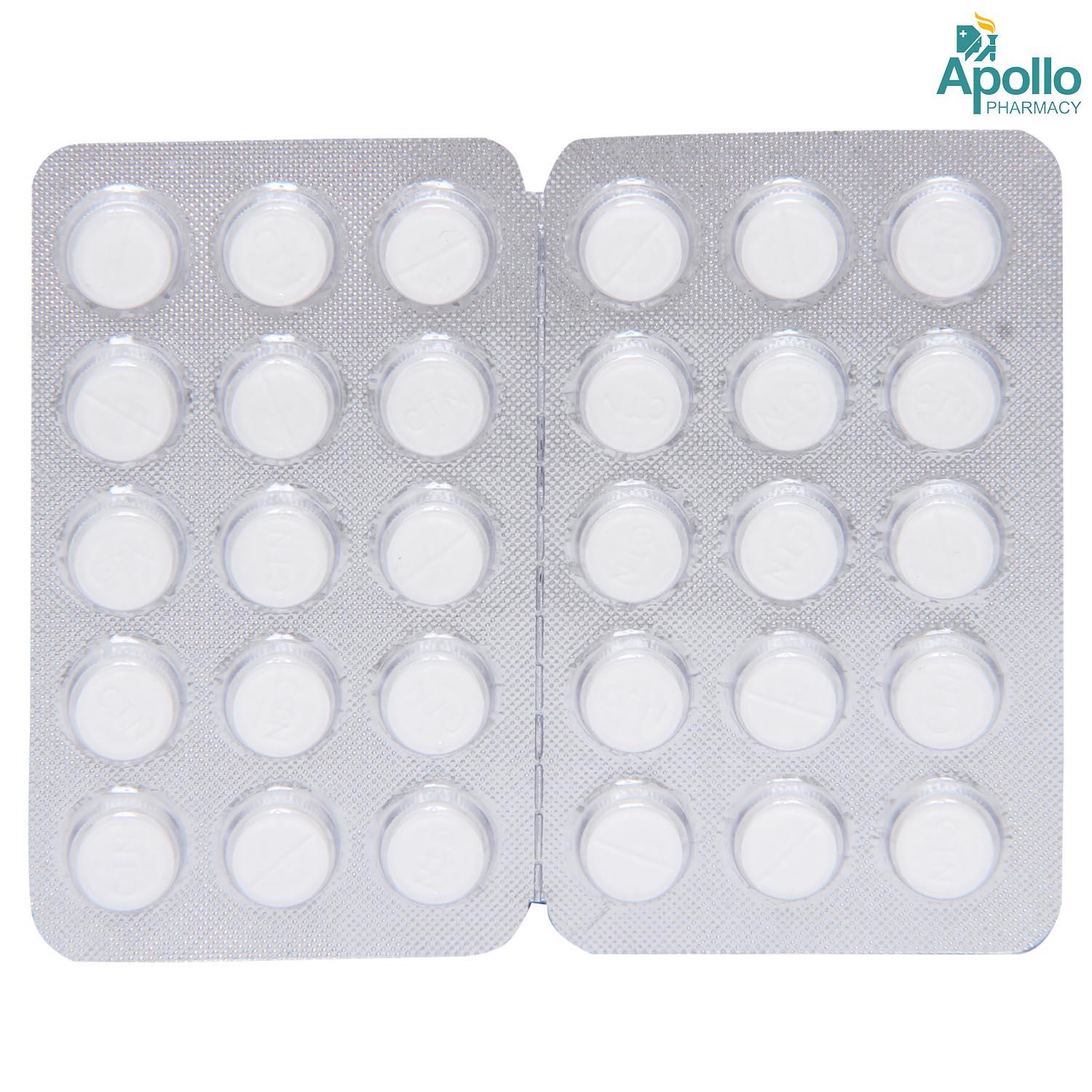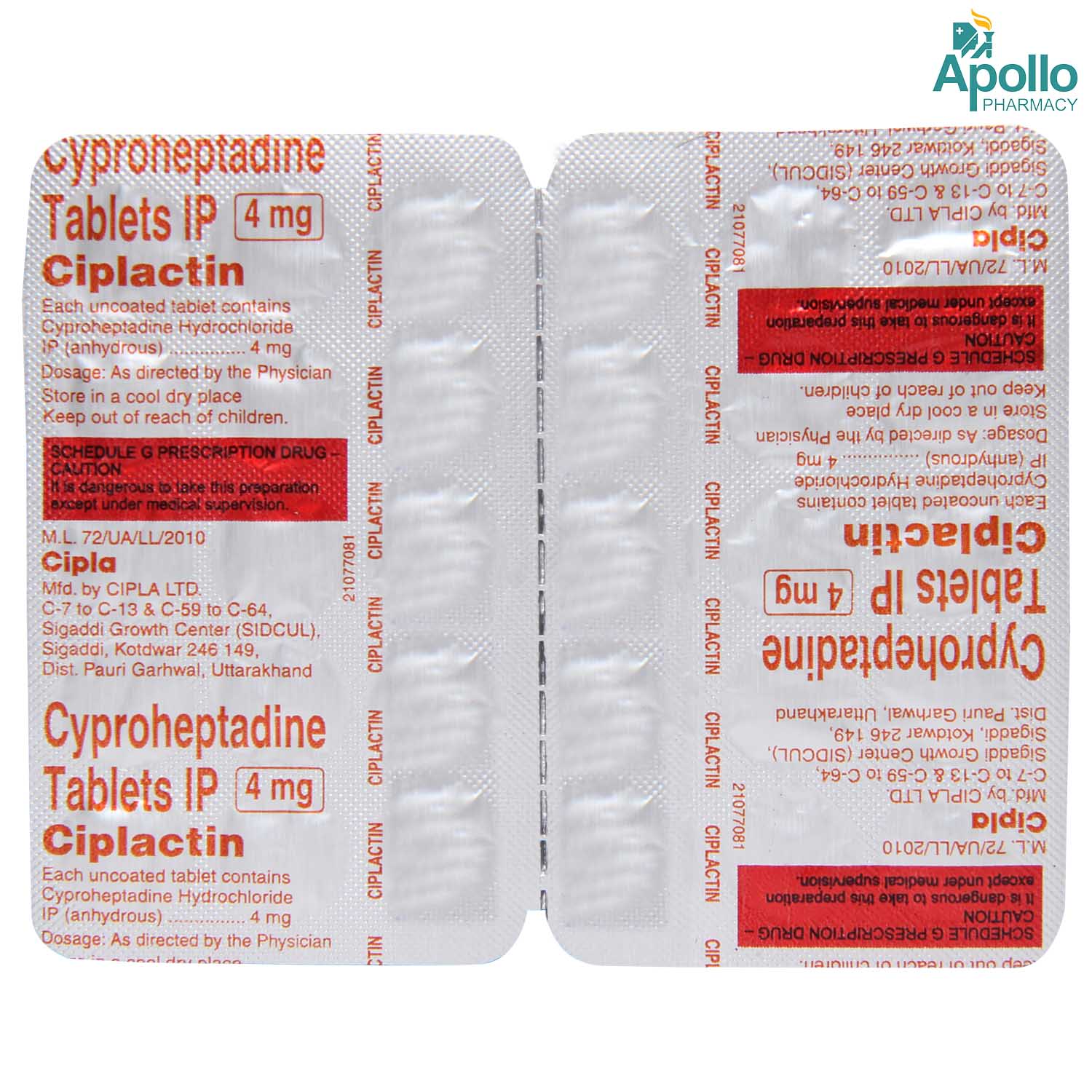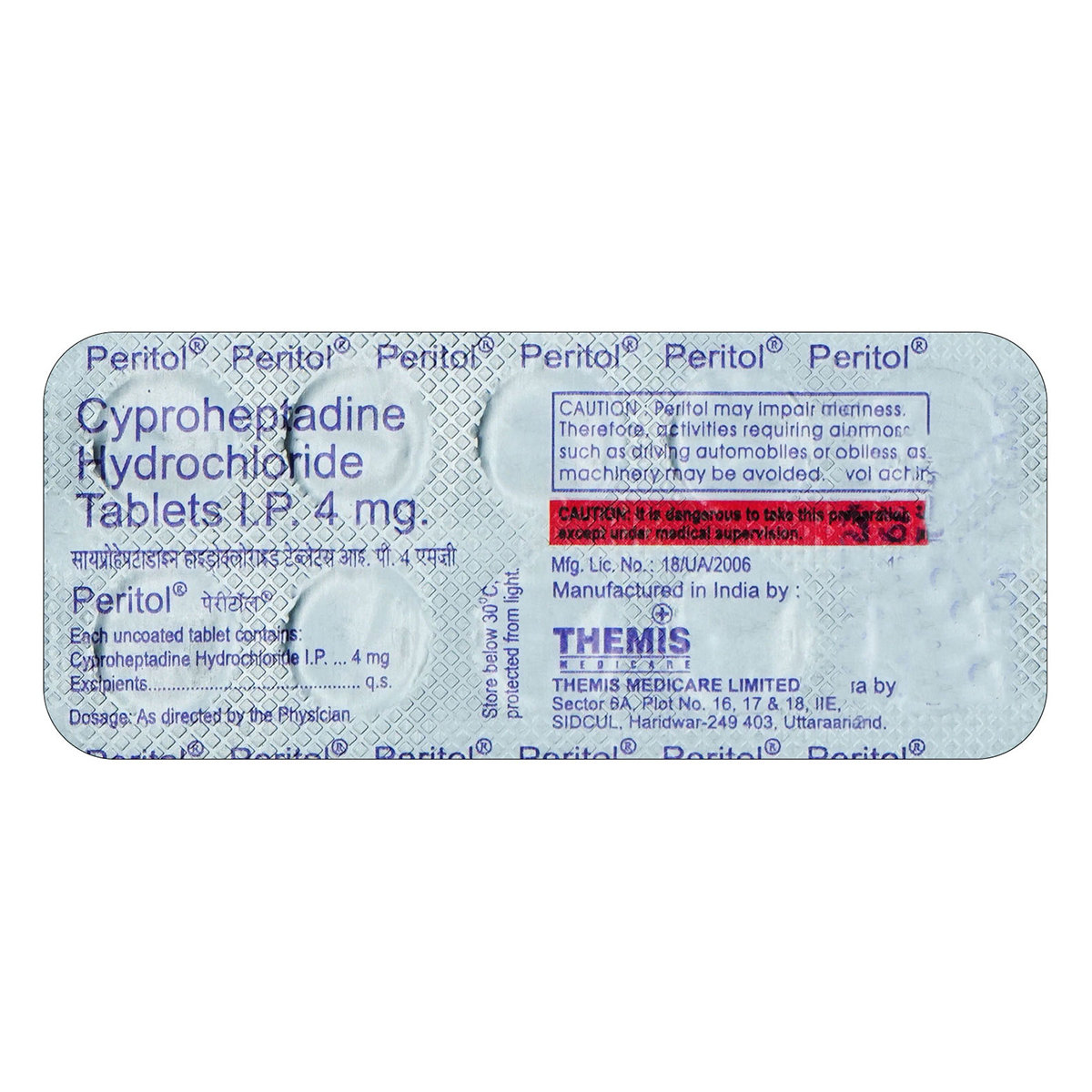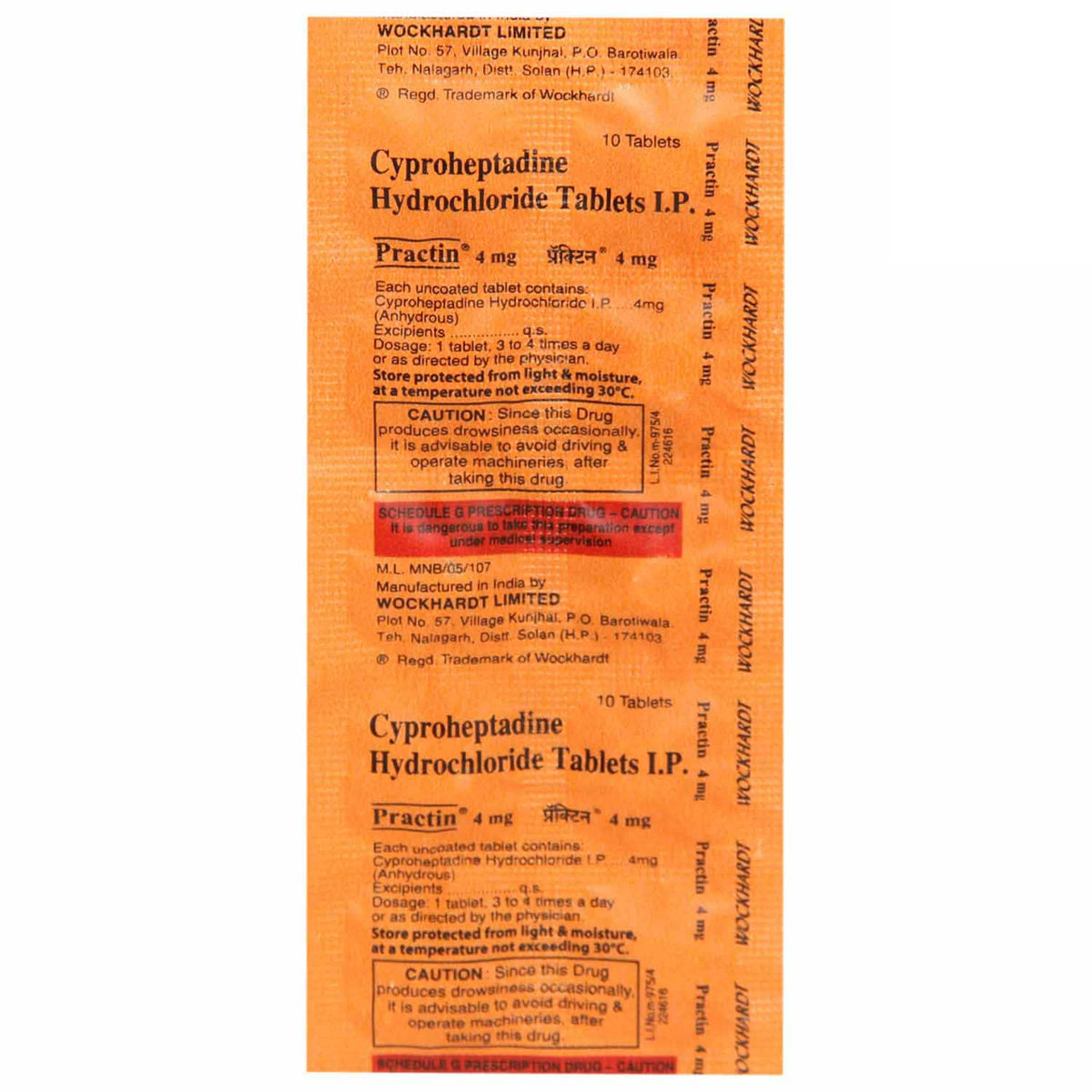Ciplactin Tablet 15's
MRP ₹61
(Inclusive of all Taxes)
₹9.2 Cashback (15%)
Provide Delivery Location
Online payment accepted
 Prescription drug
Prescription drugWhats That
Composition :
Manufacturer/Marketer :
Consume Type :
Expires on or after :
Return Policy :
About Ciplactin Tablet
Ciplactin Tablet belongs to the class of medication called 'anti-allergic' and 'anti serotonin' drugs primarily used to treat symptoms of allergies such as itching, runny nose, sneezing, or watery eyes. Besides this, Ciplactin Tablet is also used to treat certain allergic skin conditions such as urticaria (nettle rash triggered by a reaction to the medicine, food, or other irritants) and angioedema (painless swelling under the skin). An allergy occurs when foreign elements known as allergens attack and invade our body, thereby causing histamine release (a chemical messenger) that causes swelling, inflammation, redness, itchiness, itchy/watery nose and throat, and watery eyes.
Ciplactin Tablet contains Cyproheptadine which works by blocking the action of histamine, a substance responsible for causing allergic reactions. It helps to provide relief from allergy symptoms such as sneezing, running nose, watery eyes, itching, swelling, and congestion or stiffness. Ciplactin Tablet has an appetite-stimulating effect and is used to stimulate hunger in patients suffering from appetite loss.
Take Ciplactin Tablet as prescribed by your doctor. You are advised to take Ciplactin Tablet for as long as your doctor has prescribed it for you based on your medical condition. Some people may experience drowsiness, dizziness, constipation, blurred vision, restlessness, dry mouth, nose, or throat. Most of these side effects of Ciplactin Tablet do not require medical attention and gradually resolve over time. However, if the side effects persist or worsen, please consult your doctor.
If you are allergic to Ciplactin Tablet or any other medicines, please tell your doctor. Ciplactin Tablet should be used with caution in elderly patients due to the increased risk of adverse effects. Please consult a doctor before taking Ciplactin Tablet if you are pregnant or breastfeeding. Ciplactin Tablet is not recommended for children below 2 years of age, as the safety and effectiveness were not established. Avoid using Ciplactin Tablet if you have taken medicines such as linezolid, phenelzine, selegiline, rasagiline, isocarboxazid, tranylcypromine, and methylene blue injection in the past 14 days. Drive only if you are alert as Ciplactin Tablet may cause drowsiness, dizziness, or low blood pressure. Avoid consumption of alcohol with Ciplactin Tablet as it may increase the risk of adverse effects.
Uses of Ciplactin Tablet
Directions for Use
Key Benefits
Ciplactin Tablet contains Cyproheptadine, an antihistamine (anti-allergic drug) used to treat symptoms of allergies. Ciplactin Tablet blocks the action of histamine, a substance responsible for causing allergic reactions. It helps to provide relief from allergy symptoms such as sneezing, running nose, watery eyes, itching, swelling, and congestion or stiffness. Also, Ciplactin Tablet is used to treat certain allergic skin conditions such as urticaria (nettle rash triggered by a reaction to medicine, food or other irritants) and angioedema (painless swelling under the skin). Additionally, Ciplactin Tablet has an appetite-stimulating effect and is used to stimulate hunger in patients suffering from appetite loss.
Storage
- Get enough sleep. Maintain a regular sleep cycle.
- Eat a healthy diet and exercise regularly.
- Manage stress with yoga or meditation.
- Limit alcohol and caffeine.
- Avoid driving or operating machinery unless you are alert.
- Avoid driving or operating machinery or activities that require high focus until you know how the medication affects you.
- Maintain a fixed sleeping schedule, create a relaxing bedtime routine and ensure your sleeping space is comfortable to maximize your sleep quality.
- Limit alcohol and caffeine as these may worsen drowsiness and disturb sleep patterns.
- Drink plenty of water as it helps with alertness and keeps you hydrated and for overall well-being.
- Moderate physical activity can improve energy levels, but avoid intense workouts right before bedtime.
Drug Warnings
If you are allergic to Ciplactin Tablet or any other medicines, please tell your doctor. If you have high blood pressure, narrow-angle glaucoma, asthma, stomach ulcer or blockage, hyperthyroidism (overactive thyroid gland), enlarged prostate, heart or urinary problems, inform your doctor before taking Ciplactin Tablet . Ciplactin Tablet should be used with caution in elderly patients due to the increased risk of adverse effects. Please consult a doctor before taking Ciplactin Tablet if you are pregnant or breastfeeding. Ciplactin Tablet is not recommended for children below 2 years of age, as the safety and effectiveness were not established. Avoid using Ciplactin Tablet if you have taken medicines such as linezolid, phenelzine, selegiline, rasagiline, isocarboxazid, tranylcypromine, and methylene blue injection in the past 14 days. Drive only if you are alert as Ciplactin Tablet may cause drowsiness, dizziness, or low blood pressure. Avoid consumption of alcohol with Ciplactin Tablet as it may increase the risk of adverse effects.
Drug-Drug Interactions
Drug-Drug Interactions
Login/Sign Up
Taking Ciplactin Tablet with Potassium chloride can increase the risk of stomach ulcers.
How to manage the interaction:
Taking Ciplactin Tablet with Potassium chloride is not recommended, as it can lead to an interaction, can be taken if your doctor has prescribed it. However, if you experience severe stomach pain, bloating, sudden lightheadedness or dizziness, nausea, vomiting (especially with blood), decreased hunger, dark, tarry stools, consult the doctor immediately. Do not stop any medication without talking to a doctor.
Taking Ciplactin Tablet and Potassium citrate (in tablet or capsule form) together can increase the risk of stomach ulcers.
How to manage the interaction:
Taking Ciplactin Tablet with Potassium citrate is not recommended, as it may lead to an interaction but can be taken if prescribed by the doctor. However, if you experience severe stomach pain, bloating, sudden lightheadedness or dizziness, nausea, vomiting (especially with blood), decreased hunger, or dark, tarry stools, consult the doctor immediately. Do not discontinue any medications without a doctor's advice.
Using procarbazine together with Ciplactin Tablet may increase side effects.
How to manage the interaction:
Taking Ciplactin Tablet with Procarbazine is not recommended, please consult your doctor before taking it. Call a doctor if you experience dizziness, drowsiness, blurred vision, dry mouth, constipation, heat intolerance, flushing, decreased sweating, difficulty urinating, palpitation, rapid heartbeat, confusion, disorientation, and memory problems.
Using linezolid together with Ciplactin Tablet may increase side effects of Ciplactin Tablet.
How to manage the interaction:
Taking Ciplactin Tablet with Linezolid is not recommended, consult a doctor before taking it. Contact a doctor if you experience dizziness, drowsiness, blurred vision, dry mouth, constipation, heat intolerance, flushing, decreased sweating, difficulty urinating, palpitation, rapid heartbeat, confusion, disorientation, and memory problems. Do not stop using any medications without talking to a doctor.
Combining Ciplactin Tablet with Esketamine can increase the side effects.
How to manage the interaction:
Although there is a possible interaction between Ciplactin Tablet and Esketamine, you can take these medicines together if prescribed by your doctor. If you're having trouble with feeling tired, confused or finding it hard to focus, consult a doctor. Do not stop using any medications without talking to a doctor.
Taking Ciplactin Tablet with sodium oxybate can enhance the risk of negative effects.
How to manage the interaction:
Although there is a possible interaction between Ciplactin Tablet and Sodium oxybate, you can take these medicines together if prescribed by your doctor. If you notice any symptoms like feeling tired, dizzy, confused or having low blood pressure or difficulty breathing, make sure to contact your doctor right away. Do not discontinue any medications without first consulting your doctor.
Using ketamine together with Ciplactin Tablet may increase side effects.
How to manage the interaction:
Although taking Ketamine and Ciplactin Tablet together can evidently cause an interaction, it can be taken if your doctor has suggested it. If you feel dizzy, sleepy, confused, have trouble focusing, lazy, or have trouble breathing, make sure to contact your doctor right away. Do not stop using any medications without a doctor's advice.
Coadministration of Ciplactin Tablet with Zonisamide can lead to increased body temperature and decreased sweating especially in warm weather.
How to manage the interaction:
Taking Ciplactin Tablet with Zonisamide together is not recommended as it can result in an interaction, it can be taken if a doctor has advised it. However, if you experience changes in blood pressure, increased heart rate, fever, or excessive sweating, contact a doctor immediately. Make sure to hydrate yourself during warm weather or after exercise. Do not discontinue any medications without consulting a doctor.
Drug-Food Interactions
Drug-Food Interactions
Login/Sign Up
Diet & Lifestyle Advise
- Wash your hands with soap and water regularly to prevent the spread of germs.
- Eat plenty of foods rich in good bacteria like yoghurt to improve overall health.
- Drink plenty of fluids to avoid dehydration.
- Gargle with salt water for relief from sore throat.
- Avoid consumption of alcohol with Ciplactin Tablet as it may cause tiredness, drowsiness or lack of concentration.
Side Effects of Ciplactin Tablet
- Drowsiness
- Dizziness
- Constipation
- Blurred vision
- Restlessness
- Dry mouth, nose or throat
Habit Forming
Therapeutic Class
All Substitutes & Brand Comparisons
RX
Out of StockCyproan Tablet
Noel Pharma India Pvt Ltd
₹3.12
(₹0.28 per unit)
92% CHEAPERRX
Out of StockBecyp 4mg Tablet
₹8.5
(₹0.77 per unit)
78% CHEAPERRX
Out of StockCyprolite 4mg Tablet
₹10
(₹0.9 per unit)
75% CHEAPER
Author Details
We provide you with authentic, trustworthy and relevant information
Drug-Diseases Interactions
Drug-Diseases Interactions
Login/Sign Up
FAQs
Drug-Drug Interactions Checker List
- DIPHENHYDRAMINE
- CETIRIZINE
- DULOXETINE
- FLUOXETINE
- TOPIRAMATE
- PREGABALIN
- QUETIAPINE
Special Advise
- Ciplactin Tablet is not recommended for use in children below 2 years of age.
- Prolonged use of Ciplactin Tablet may diminish mental alertness, so avoid driving a motor vehicle or performing a hazardous task after taking this medicine.
- If you have used any MAOs inhibitors antidepressant pills (like selegiline, phenelzine, tranylcypromine, isocarboxazid) within the last 14 days, avoid using Ciplactin Tablet .
- Ciplactin Tablet should be used by people with asthma, glaucoma, thyroid disorder, and heart problems.
Disease/Condition Glossary
Allergies: It occurs when foreign elements known as allergens attack and invade our body, thereby causing the release of histamines. This chemical messenger 'histamines' causes swelling, inflammation, redness, itchiness, itchy/watery nose and throat, and watery eyes. Allergies generally occur due to chemicals, air pollution, pet danders, dust, pollen hairs, seasonal allergies like hay fever, etc.

Have a query?
Alcohol
Safe if prescribed
Avoid consumption of alcohol with Ciplactin Tablet as it may increase the risk of adverse effects such as drowsiness, dizziness or difficulty in concentrating. Please consult a doctor before consuming alcohol with Ciplactin Tablet .
Pregnancy
Consult your doctor
Ciplactin Tablet is a category B pregnancy drug and is given to pregnant women only if the doctor thinks it is essential. Please consult a doctor if you are pregnant.
Breast Feeding
Consult your doctor
Ciplactin Tablet is given to breastfeeding women only if the doctor thinks benefits are greater than risks. Please consult a doctor if you are breastfeeding.
Driving
Safe if prescribed
Ciplactin Tablet may cause drowsiness, dizziness or low blood pressure in elderly people. Therefore, drive only if you are alert and your vision is clear after taking Ciplactin Tablet .
Liver
Consult your doctor
Take Ciplactin Tablet with caution, especially if you have a history of Liver diseases/conditions. The dose may be adjusted by your doctor as required.
Kidney
Consult your doctor
Take Ciplactin Tablet with caution, especially if you have a history of Kidney diseases/conditions. The dose may be adjusted by your doctor as required.
Children
Safe if prescribed
Ciplactin Tablet is not recommended for children below 2 years as the safety and effectiveness were not established.

